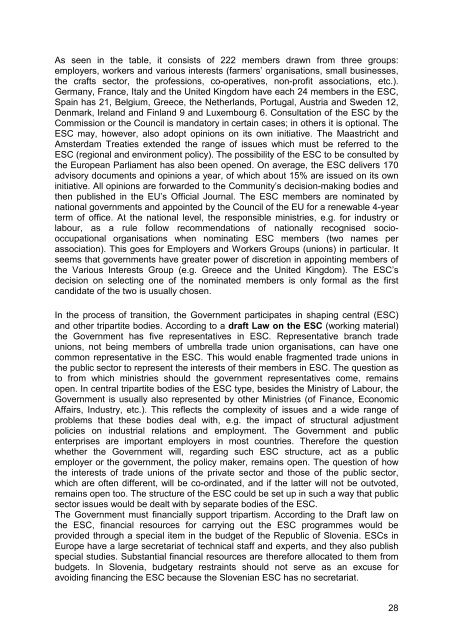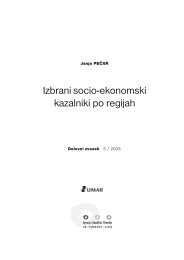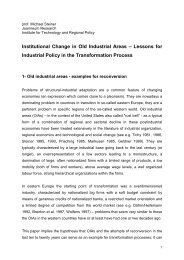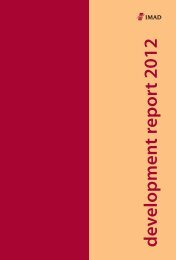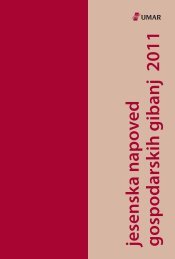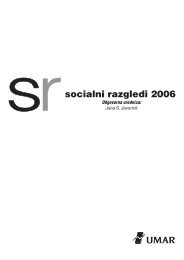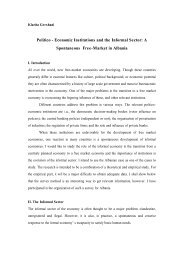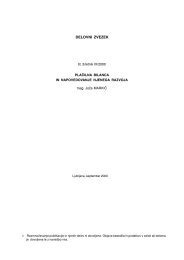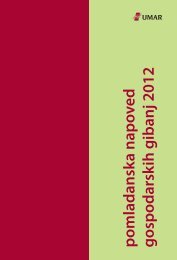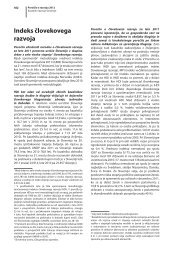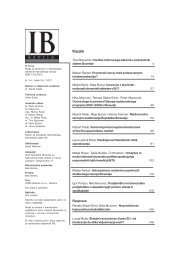The Development of New Industrial Relations in Slovenia - UMAR
The Development of New Industrial Relations in Slovenia - UMAR
The Development of New Industrial Relations in Slovenia - UMAR
Create successful ePaper yourself
Turn your PDF publications into a flip-book with our unique Google optimized e-Paper software.
As seen <strong>in</strong> the table, it consists <strong>of</strong> 222 members drawn from three groups:<br />
employers, workers and various <strong>in</strong>terests (farmers’ organisations, small bus<strong>in</strong>esses,<br />
the crafts sector, the pr<strong>of</strong>essions, co-operatives, non-pr<strong>of</strong>it associations, etc.).<br />
Germany, France, Italy and the United K<strong>in</strong>gdom have each 24 members <strong>in</strong> the ESC,<br />
Spa<strong>in</strong> has 21, Belgium, Greece, the Netherlands, Portugal, Austria and Sweden 12,<br />
Denmark, Ireland and F<strong>in</strong>land 9 and Luxembourg 6. Consultation <strong>of</strong> the ESC by the<br />
Commission or the Council is mandatory <strong>in</strong> certa<strong>in</strong> cases; <strong>in</strong> others it is optional. <strong>The</strong><br />
ESC may, however, also adopt op<strong>in</strong>ions on its own <strong>in</strong>itiative. <strong>The</strong> Maastricht and<br />
Amsterdam Treaties extended the range <strong>of</strong> issues which must be referred to the<br />
ESC (regional and environment policy). <strong>The</strong> possibility <strong>of</strong> the ESC to be consulted by<br />
the European Parliament has also been opened. On average, the ESC delivers 170<br />
advisory documents and op<strong>in</strong>ions a year, <strong>of</strong> which about 15% are issued on its own<br />
<strong>in</strong>itiative. All op<strong>in</strong>ions are forwarded to the Community’s decision-mak<strong>in</strong>g bodies and<br />
then published <strong>in</strong> the EU’s Official Journal. <strong>The</strong> ESC members are nom<strong>in</strong>ated by<br />
national governments and appo<strong>in</strong>ted by the Council <strong>of</strong> the EU for a renewable 4-year<br />
term <strong>of</strong> <strong>of</strong>fice. At the national level, the responsible m<strong>in</strong>istries, e.g. for <strong>in</strong>dustry or<br />
labour, as a rule follow recommendations <strong>of</strong> nationally recognised sociooccupational<br />
organisations when nom<strong>in</strong>at<strong>in</strong>g ESC members (two names per<br />
association). This goes for Employers and Workers Groups (unions) <strong>in</strong> particular. It<br />
seems that governments have greater power <strong>of</strong> discretion <strong>in</strong> appo<strong>in</strong>t<strong>in</strong>g members <strong>of</strong><br />
the Various Interests Group (e.g. Greece and the United K<strong>in</strong>gdom). <strong>The</strong> ESC’s<br />
decision on select<strong>in</strong>g one <strong>of</strong> the nom<strong>in</strong>ated members is only formal as the first<br />
candidate <strong>of</strong> the two is usually chosen.<br />
In the process <strong>of</strong> transition, the Government participates <strong>in</strong> shap<strong>in</strong>g central (ESC)<br />
and other tripartite bodies. Accord<strong>in</strong>g to a draft Law on the ESC (work<strong>in</strong>g material)<br />
the Government has five representatives <strong>in</strong> ESC. Representative branch trade<br />
unions, not be<strong>in</strong>g members <strong>of</strong> umbrella trade union organisations, can have one<br />
common representative <strong>in</strong> the ESC. This would enable fragmented trade unions <strong>in</strong><br />
the public sector to represent the <strong>in</strong>terests <strong>of</strong> their members <strong>in</strong> ESC. <strong>The</strong> question as<br />
to from which m<strong>in</strong>istries should the government representatives come, rema<strong>in</strong>s<br />
open. In central tripartite bodies <strong>of</strong> the ESC type, besides the M<strong>in</strong>istry <strong>of</strong> Labour, the<br />
Government is usually also represented by other M<strong>in</strong>istries (<strong>of</strong> F<strong>in</strong>ance, Economic<br />
Affairs, Industry, etc.). This reflects the complexity <strong>of</strong> issues and a wide range <strong>of</strong><br />
problems that these bodies deal with, e.g. the impact <strong>of</strong> structural adjustment<br />
policies on <strong>in</strong>dustrial relations and employment. <strong>The</strong> Government and public<br />
enterprises are important employers <strong>in</strong> most countries. <strong>The</strong>refore the question<br />
whether the Government will, regard<strong>in</strong>g such ESC structure, act as a public<br />
employer or the government, the policy maker, rema<strong>in</strong>s open. <strong>The</strong> question <strong>of</strong> how<br />
the <strong>in</strong>terests <strong>of</strong> trade unions <strong>of</strong> the private sector and those <strong>of</strong> the public sector,<br />
which are <strong>of</strong>ten different, will be co-ord<strong>in</strong>ated, and if the latter will not be outvoted,<br />
rema<strong>in</strong>s open too. <strong>The</strong> structure <strong>of</strong> the ESC could be set up <strong>in</strong> such a way that public<br />
sector issues would be dealt with by separate bodies <strong>of</strong> the ESC.<br />
<strong>The</strong> Government must f<strong>in</strong>ancially support tripartism. Accord<strong>in</strong>g to the Draft law on<br />
the ESC, f<strong>in</strong>ancial resources for carry<strong>in</strong>g out the ESC programmes would be<br />
provided through a special item <strong>in</strong> the budget <strong>of</strong> the Republic <strong>of</strong> <strong>Slovenia</strong>. ESCs <strong>in</strong><br />
Europe have a large secretariat <strong>of</strong> technical staff and experts, and they also publish<br />
special studies. Substantial f<strong>in</strong>ancial resources are therefore allocated to them from<br />
budgets. In <strong>Slovenia</strong>, budgetary restra<strong>in</strong>ts should not serve as an excuse for<br />
avoid<strong>in</strong>g f<strong>in</strong>anc<strong>in</strong>g the ESC because the <strong>Slovenia</strong>n ESC has no secretariat.<br />
28


